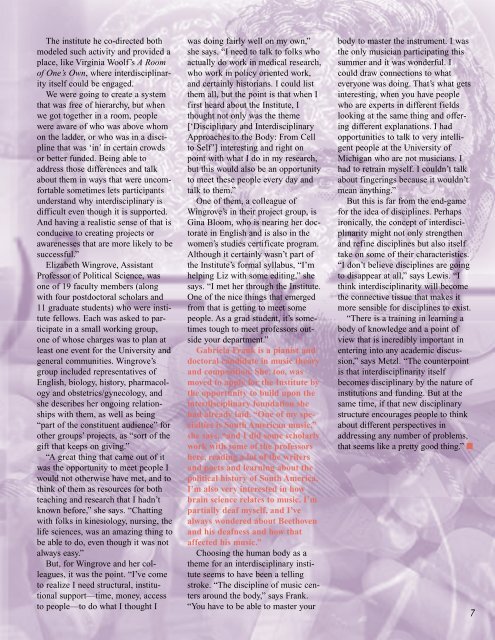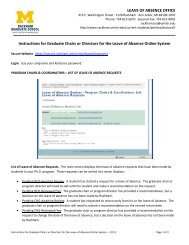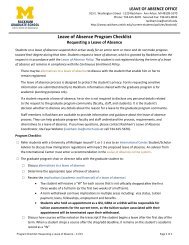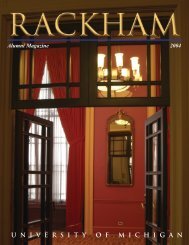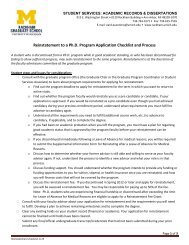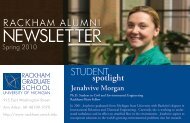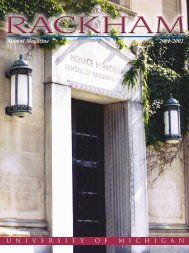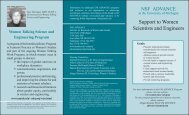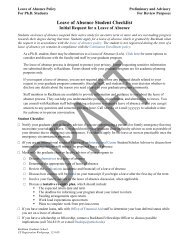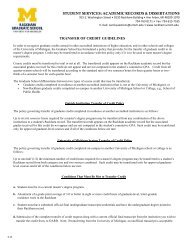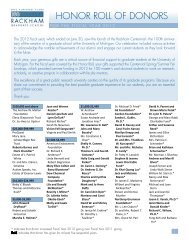Rackham Graduate School - University of Michigan
Rackham Graduate School - University of Michigan
Rackham Graduate School - University of Michigan
- No tags were found...
Create successful ePaper yourself
Turn your PDF publications into a flip-book with our unique Google optimized e-Paper software.
The institute he co-directed bothmodeled such activity and provided aplace, like Virginia Woolf’s A Room<strong>of</strong> One’s Own, where interdisciplinarityitself could be engaged.We were going to create a systemthat was free <strong>of</strong> hierarchy, but whenwe got together in a room, peoplewere aware <strong>of</strong> who was above whomon the ladder, or who was in a disciplinethat was ‘in’ in certain crowdsor better funded. Being able toaddress those differences and talkabout them in ways that were uncomfortablesometimes lets participantsunderstand why interdisciplinary isdifficult even though it is supported.And having a realistic sense <strong>of</strong> that isconducive to creating projects orawarenesses that are more likely to besuccessful.”Elizabeth Wingrove, AssistantPr<strong>of</strong>essor <strong>of</strong> Political Science, wasone <strong>of</strong> 19 faculty members (alongwith four postdoctoral scholars and11 graduate students) who were institutefellows. Each was asked to participatein a small working group,one <strong>of</strong> whose charges was to plan atleast one event for the <strong>University</strong> andgeneral communities. Wingrove’sgroup included representatives <strong>of</strong>English, biology, history, pharmacologyand obstetrics/gynecology, andshe describes her ongoing relationshipswith them, as well as being“part <strong>of</strong> the constituent audience” forother groups’ projects, as “sort <strong>of</strong> thegift that keeps on giving.”“A great thing that came out <strong>of</strong> itwas the opportunity to meet people Iwould not otherwise have met, and tothink <strong>of</strong> them as resources for bothteaching and research that I hadn’tknown before,” she says. “Chattingwith folks in kinesiology, nursing, thelife sciences, was an amazing thing tobe able to do, even though it was notalways easy.”But, for Wingrove and her colleagues,it was the point. “I’ve cometo realize I need structural, institutionalsupport—time, money, accessto people—to do what I thought Iwas doing fairly well on my own,”she says. “I need to talk to folks whoactually do work in medical research,who work in policy oriented work,and certainly historians. I could listthem all, but the point is that when Ifirst heard about the Institute, Ithought not only was the theme[‘Disciplinary and InterdisciplinaryApproaches to the Body: From Cellto Self’] interesting and right onpoint with what I do in my research,but this would also be an opportunityto meet these people every day andtalk to them.”One <strong>of</strong> them, a colleague <strong>of</strong>Wingrove’s in their project group, isGina Bloom, who is nearing her doctoratein English and is also in thewomen’s studies certificate program.Although it certainly wasn’t part <strong>of</strong>the Institute’s formal syllabus, “I’mhelping Liz with some editing,” shesays. “I met her through the Institute.One <strong>of</strong> the nice things that emergedfrom that is getting to meet somepeople. As a grad student, it’s sometimestough to meet pr<strong>of</strong>essors outsideyour department.”Gabriela Frank is a pianist anddoctoral candidate in music theoryand composition. She, too, wasmoved to apply for the Institute bythe opportunity to build upon theinterdisciplinary foundation shehad already laid. “One <strong>of</strong> my specialtiesis South American music,”she says, “and I did some scholarlywork with some <strong>of</strong> the pr<strong>of</strong>essorshere, reading a lot <strong>of</strong> the writersand poets and learning about thepolitical history <strong>of</strong> South America.I’m also very interested in howbrain science relates to music. I’mpartially deaf myself, and I’vealways wondered about Beethovenand his deafness and how thataffected his music.”Choosing the human body as atheme for an interdisciplinary instituteseems to have been a tellingstroke. “The discipline <strong>of</strong> music centersaround the body,” says Frank.“You have to be able to master yourbody to master the instrument. I wasthe only musician participating thissummer and it was wonderful. Icould draw connections to whateveryone was doing. That’s what getsinteresting, when you have peoplewho are experts in different fieldslooking at the same thing and <strong>of</strong>feringdifferent explanations. I hadopportunities to talk to very intelligentpeople at the <strong>University</strong> <strong>of</strong><strong>Michigan</strong> who are not musicians. Ihad to retrain myself. I couldn’t talkabout fingerings because it wouldn’tmean anything.”But this is far from the end-gamefor the idea <strong>of</strong> disciplines. Perhapsironically, the concept <strong>of</strong> interdisciplinaritymight not only strengthenand refine disciplines but also itselftake on some <strong>of</strong> their characteristics.“I don’t believe disciplines are goingto disappear at all,” says Lewis. “Ithink interdisciplinarity will becomethe connective tissue that makes itmore sensible for disciplines to exist.“There is a training in learning abody <strong>of</strong> knowledge and a point <strong>of</strong>view that is incredibly important inentering into any academic discussion,”says Metzl. “The counterpointis that interdisciplinarity itselfbecomes disciplinary by the nature <strong>of</strong>institutions and funding. But at thesame time, if that new disciplinarystructure encourages people to thinkabout different perspectives inaddressing any number <strong>of</strong> problems,that seems like a pretty good thing.” ■7


